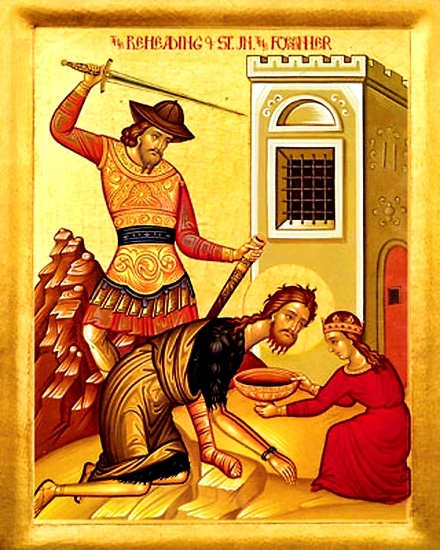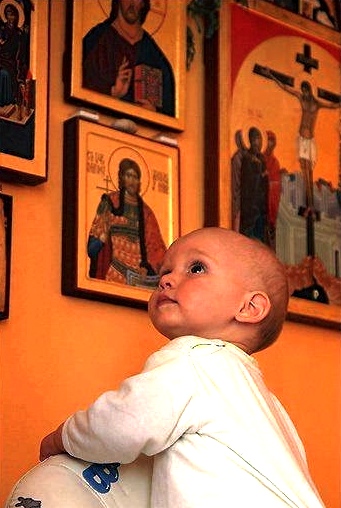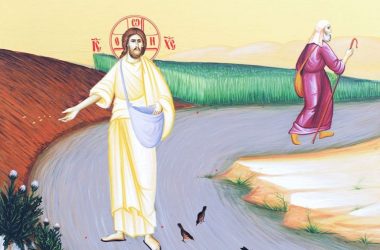The Church of Christ dresses in black and shares in the suffering to commemorate the beheading of Saint John the Baptist, the Forerunner and prophet of the Lord Jesus Christ.
It is a solemn feast observed with rigorous fasting and prayer, and the celebration of the Liturgy. During this time, we do not sing joyful songs of life, but instead, we mourn the death of the greatest man born of woman, as proclaimed by the Son of God Himself.
Beyond the symbolic-theological significance of his teachings, which revealed the Way-Christ, we must acknowledge that the very moment and context of the death of Saint John carry a profound semiotic. In it, we truly witness the extension of evil in the universe, the power of cunning and insignificance, the destructive vector of perverted human will, God’s tearful patience, the anticipation of ages, and – why not – a validation of hell as a measure of freedom in estrangement from God.
The prophet of purity meets his demise in this world, within the abode of premeditated impurity. The chosen advocate of virtue and chastity is ruthlessly slain by the mother of debauchery and her followers. The resounding voice echoing through the ages is silenced by the instruments of wickedness. The keen mind that comprehends history is extinguished by the intoxication and foolishness of the wicked. The seer and devout servant of God, even from his mother’s womb, becomes the everlasting victim of the blind and unfeeling. The witness of the glorious manifestation of the Holy Trinity is now hushed under the onslaught of diabolical men. The esteemed teacher of repentance is mercilessly murdered by the adherents of deceit and ill-gotten riches. The gentle dove of inner solitude is slaughtered by those consumed by a thirst for earthly power.
All these events are allowed by God, who demonstrated through John the power of love to triumph over death and traverse the realms of earth, hell, and heaven in the proclamation of the overflowing Light.
The man, bearing wisdom, his head sanctified by the divine gaze, is tragically beheaded by the ignorant ones, whose beasty senses have become their sole purpose. The hand that once touched the Crown of the Eternal Lord now lies motionless, unable to expose the guilt of excessive debauchery.
The woman, the source of debauchery, could have sought cities, boundless wealth, high positions, and grand promises, gold and silver. Instead, she demanded the death of the holiest among mortals. This act represents the epitome of essential wickedness, the absurdity of death, and the ignorance of damnation. It embodies the eternal futility and emptiness of evil, which turns inward upon itself. It is the self-destructive gesture of long-term cunning. Furthermore, it symbolizes the inherited calling of cunning, a calling that has been punished in the flood, in Sodom, and in Egypt. It reveals the malevolent power of a woman when a man is enslaved by dark passions, becoming an unwitting and unfree instrument of murder.
The killing of John, serving as a prophecy for the countless Christian martyrs throughout history, becomes even more chilling in its absolute senselessness. It is the tragic outcome of a drunken oath, clouded by lustful desires, and could have been easily revoked by the king’s decision at any time. The celestial virtues that resided divinely within the soul and life of the great Forerunner are scorned by the gravest sins, which bear the marks of nothingness and death: adultery, incest, drunkenness, malice, and cunning.
Amidst all the pain it entails, the death of Saint John stands as a prophetic foreshadowing of the Crucifixion of the Lamb of God, proclaiming the boundless love that God holds for humanity. It is a love so immense that He willingly offers His life for them, remaining by their side until the very end, and descending into the depths of hell for the sake of His fallen creation.
However, the death of the prophet serves as a powerful admonishment for each one of us. Where do we stand? Are we in the cold prison cell, awaiting execution in prayer, or are we indulging in the debauchery of this age at lavish feasts? Are we faithful witnesses unto death for the sake of truth, or do we cunningly advocate for compromise with evil? Do we embrace the solitude of the wilderness or the allure of worldly pleasures? Are we descendants of John, steadfast in our devotion, or do we align ourselves with the likes of Herod and Herodias? This current celebration serves as an inner judgment of the ages, a court that distinguishes between the people of God and the people of the evil one. The most sacred head, which once gazed upon the heavens, continuously reproaches those who trample upon God’s sacrificial love for humankind, throughout all generations.
John is the unwavering and faithful witness who lived and died to behold the untainted Lamb of God and share in His holiness. His beheading is a testament to love extinguished which eternally resides within God’s heart and permeates the unseen realm, infusing the ages with the brilliance of heavenly light.
Rev. Ioan Istrati





